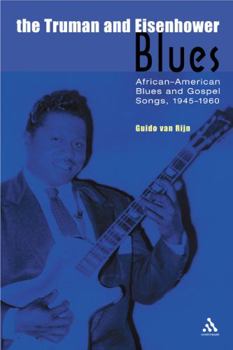The Truman and Eisenhower Blues: African-American Blues and Gospel Songs, 1945-1960
Select Format
Select Condition 
Book Overview
Twenty-six of the songs discussed in the text are available on a CD produced by Agram Blues (ABCD 2018) to accompany this book. Digitally remastered and featuring full liner notes by the author, the CD is a unique historical document of the Truman and Eisenhower presidencies.
Format:Paperback
Language:English
ISBN:0826456588
ISBN13:9780826456588
Release Date:June 2004
Publisher:Continuum
Length:240 Pages
Weight:1.20 lbs.
Dimensions:0.7" x 6.2" x 9.2"
Customer Reviews
2 ratings
great documentation
Published by Thriftbooks.com User , 16 years ago
Quite an interesting study, a nice mix of history, sociology and musicology. The transcription of the countless blues texts must have been a hell of a job: all honour to the author. Don't forget to buy the interesting cd that accompanies this book. Koos Hennephof, Holland
PRESIDENT BLUES
Published by Thriftbooks.com User , 20 years ago
Ever since the Negro spirituals first reached a broader public consciousness in the years during and immediately following the Civil War, African American folksongs and their popular extensions in blues and gospel song have been viewed by listeners, critics, collectors, and scholars as expressions of an entire race within America, or at least of a vast portion of that race, one that had few other outlets of expression that left any lasting record. With few exceptions, the singers and composers of these songs were not the writers of poems, books, articles, and letters to the editors of newspapers. They were not leaders in politics, the church, and business. Many, particularly those involved mainly in secular music, were not even members of churches, labor unions, or other organizations. Yet they had opinions about the world around them, they served as organizers of the opinions of others and, with the help of mass media such as phonograph records, as spokespersons for millions of people from similar backgrounds. While their songs were created and intended almost entirely for hearing and circulation within their own social group, many curious and sympathetic listeners of a more formally educated and literate class have found these songs to be an invaluable key to understanding this group which otherwise often seems inarticulate, inscrutable, or threatening. These songs not only provide insight into another social world, but they entertain and please the ear with their artistry. Unintentionally perhaps, they bridge some of the great social and racial divides that America has created, as well as providing spiritual and artistic nourishment for the victims of these divides.Writers and scholars have concentrated on three major domains in the study of the lyrics of African American folk, blues, and gospel songs. They have seen them as examples of literary expression, as reflections of daily life and living conditions, and as expressions of opinion and psychological states. Even when concentrating on one of these domains, most writers have shown some awareness of the others. In searching for literary expression, one can hardly avoid the social content of these songs, and with opinion and description of daily life often comes great artistry.Early twentieth century writers and collectors, such as Howard Odum, Guy Johnson, Newman White, Dorothy Scarborough and John A. Lomax, saw the song lyrics as examples of the "folk poetry" or "folk psychology" of "the Negro." Although some indicated that they were struck by the power and artistry of particular performances and the personalities of some of their informants, for the most part they treated the songs as anonymous collective expression. Odum, however, felt compelled to create a composite character, a Black Ulysses, to be the voice for many of the songs he had collected in the South, and Scarborough consulted black songwriter W. C. Handy as an expert on the meaning of the blues. Lomax did provide the names of





